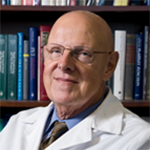Michael J. Welch, PhD, a pioneering radiochemist who was the author of more than 550 papers on the use of radioactive drugs in diagnosis and treatment of disease, died Sunday, May 6, 2012 at Barnes-Jewish Hospital. He was 72.

Welch’s many accomplishments include contributions to the compounds that allow imaging of brain blood flow and creation of imaging agents for the study of many types of cancer. He also worked to ensure that an adequate supply of radiopharmaceuticals was available for medical treatment.
Welch was professor of radiology, of chemistry, of biomedical engineering and of developmental biology. He was the founding leader of the Oncologic Imaging Research Program at the Alvin J. Siteman Cancer Center at Barnes-Jewish Hospital and Washington University School of Medicine and a member of the cancer center’s senior leadership.
The Washington University flag was lowered to half-staff May 7 for three days in his memory.
“We are blessed with quite a few spectacular scientists here at Washington University, but Michael Welch was truly one of the giants,” says Robert J. Gropler, MD, chief of the Division of Radiological Sciences and a frequent collaborator with Welch. “We’ve lost someone very special.”
Welch, who was born and raised in Stoke-on-Trent in England, earned bachelor’s and master’s degrees in natural sciences at Cambridge University. He earned a doctorate in chemistry at the University of London in 1965.
Welch joined the Washington University faculty in 1967. Through mentor Michel Ter-Pogossian, PhD, Welch contributed to the development of positron emission tomography (PET) at the university in the early 1970s.
“Michael Welch was the most amazingly plugged-in scientist in terms of the interfaces between many different disciplines of biomedicine and other sciences,” says Welch’s longtime collaborator and friend, Barry Siegel, MD, chief of the Division of Nuclear Medicine.
Welch was elected to the Institute of Medicine and received many of his field’s highest honors, including the Benedict Cassen Award from the Society of Nuclear Medicine. In 2008, the society named its award for outstanding contributions to radiopharmaceutical research after Welch. Washington University’s recognitions of Welch have included its Distinguished Faculty Award and its Second Century Award.
In accordance with Welch’s wishes, there will be no funeral service.
Memorial contributions may be made to The Michael J. Welch Foundation, 55 Walls Drive, Fairfield, Conn., 06824. A website, mjwelchfoundation.org, also is in development. His survivors are establishing the foundation to support research in nuclear medicine.
A memorial service will be held at the university’s Graham Chapel in the near future.
Welch is survived by his son, Colin, and Colin’s wife, Susan, along with their three children; and his daughter, Lesley Tomlin, her husband, Chris, and their two daughters. He will be dearly missed by his long-time companion, Mickey Clarke, manager of the Human Research Quality Assurance Program in the office of the Vice Chancellor for Research at the university.
Washington University School of Medicine’s 2,100 employed and volunteer faculty physicians also are the medical staff of Barnes-Jewish and St. Louis Children’s hospitals. The School of Medicine is one of the leading medical research, teaching and patient care institutions in the nation, currently ranked sixth in the nation by U.S. News & World Report. Through its affiliations with Barnes-Jewish and St. Louis Children’s hospitals, the School of Medicine is linked to BJC HealthCare.